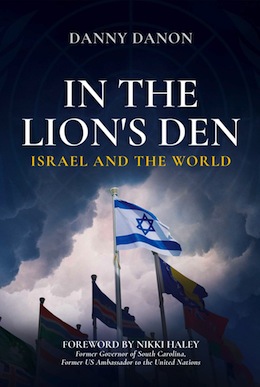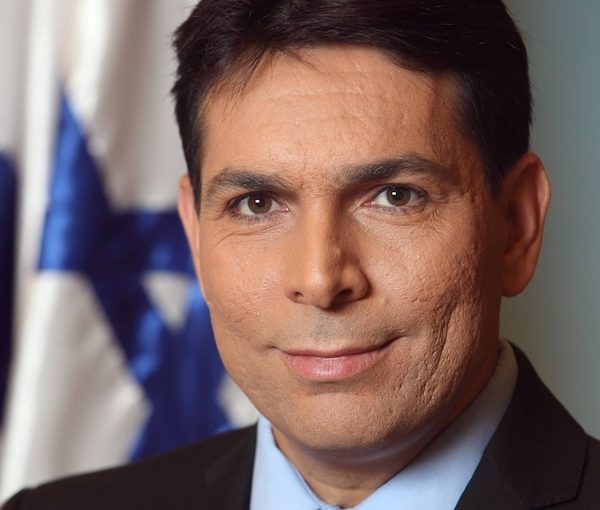Danny Danon, former Israeli envoy to the United Nations. (photo from IGPO / Chaim Tzach)
“Jerusalem is an inseparable part of Israel and her eternal capital,” said an Israeli prime minister. “No United Nations vote can alter that historic fact.” This quote, which could have come from any of the country’s leaders, was in fact spoken by the first, David Ben-Gurion, in 1949, just days after the UN voted for the internationalization of the city. Israel’s issues with the agency, in other words, have existed for some time.
One wouldn’t expect a right-wing Likud party stalwart, well-known hothead and self-acknowledged non-diplomat to be one of Israel’s foremost voices to present an unambiguous defence of the UN. But, in his new book, Danny Danon does exactly that.
Danon’s book, In the Lion’s Den: Israel and the World, focuses on his term as Israeli ambassador to the United Nations, from 2015 to 2020. Before that, he was a Likud member of the Knesset and a minister in Binyamin Netanyahu’s government.
He acknowledges that, when he was appointed to the diplomatic post, commentators in Israel and elsewhere suggested that Netanyahu was deliberately poking a stick in the belly of the beast.
“There was an expectation that, because of my background and strong ideological beliefs, I would not fit into the world of diplomacy, that I was too much of a hawk and a ‘hardliner,’ which would make it difficult for me to build relationships and achieve anything of substance,” he writes.
Well, yes and no. He does not fit into the world of diplomacy. But he does claim a litany of successes. Danon devotes nearly 200 pages to justifying Israel’s engagement with the international body. Despite the routine censures of Israel and seeming obsession the General Assembly and several of the UN’s agencies have with Israel, Danon argues convincingly that taking on the haters in that forum is a worthy enterprise.
“What many people don’t understand is that there is a public UN and a private UN,” he writes. “The public face of the UN – at least when it comes to Israel – is aggressive and bullying. But, privately, you can build bridges, forge friendships and create a space for understanding, particularly if you are transparent.”
His own approach – far more bull in a china shop than circumspect diplomat – has its merits, he contends. His calling out of critics by name, apparently nearly unheard of in the hallowed halls of the UN’s Manhattan headquarters, may have drawn gasps, but it also seems to have made some think twice before talking.
“After a few times calling out the French ambassador in the media, not only did he reiterate that he did not appreciate it, which had no effect on me, but, more importantly, it made him much more careful in the words he used and actions he took going forward.” Danon said.
 In one segment, the former ambassador goes into extensive detail about the efforts he made to derail two particularly troublesome resolutions. “Both resolutions were pointless,” he acknowledged, which might describe most of the General Assembly resolutions against Israel, but this comment, in turn, raises the legitimate question about why such energy and resources are devoted to fighting them. Danon’s argument is that it is in Israel’s interest not to ignore them and to take up the fight whenever and wherever possible.
In one segment, the former ambassador goes into extensive detail about the efforts he made to derail two particularly troublesome resolutions. “Both resolutions were pointless,” he acknowledged, which might describe most of the General Assembly resolutions against Israel, but this comment, in turn, raises the legitimate question about why such energy and resources are devoted to fighting them. Danon’s argument is that it is in Israel’s interest not to ignore them and to take up the fight whenever and wherever possible.
If his own account of his time there is to be believed, Danon achieved many victories.
He caused the UN to officially recognize Jewish holidays so that, for example, no major meetings occur on Yom Kippur. He managed to get a small amount of kosher food onto the menu at the UN staff cafeteria – and it was promptly snapped up by non-Jews who view a hechsher as proof of healthy, quality food.
More substantively, he hosted more than 100 ambassadors on delegations or missions to Israel.
Partly as a result of a conference that Danon organized for fellow ambassadors on the subject of antisemitism, the UN issued its first-ever thorough report dedicated entirely to anti-Jewish racism.
After successfully pressuring for a UN bureaucrat who is Israeli to be promoted (apparently a challenge), he took on a more entrenched problem. The UN unofficially boycotts Israel, he writes, passing over Israeli options in the agency’s not-insubstantial procurement process. He set out what he called the three T’s.
“We would sell our relevant technology, offer training and provide troops,” he said. The first two he succeeded in.
“I believe the last T, providing troops to UN peacekeeping missions, will come in time,” he writes. “Sending troops is still an ongoing effort on our part. We have one of the best trained militaries in the world, and it knows how to deal with many difficult conflicts. We have so many security challenges that require us to engage in prevention, deflection and defence that it puts us in a unique position of having both the know-how and the experience on the ground. This gives us an advantage in comparison to others. We have the expertise to train UN forces, such as search and rescue, medical treatment in the field, and addressing acute emergency situations…. It has not happened yet, but I am hopeful. It remains a goal for the future.”
For all its flaws, Danon argues, the UN is a unique environment where an Israeli ambassador can shmooze with people he would never get to meet otherwise.
“Think of this: anytime a special envoy from Israel travels to an Arab country, it has to be done with the utmost discretion. If such visits were to be discussed publicly, they could become an issue that could result in political backlash or even violence from extremists and terrorists. At the UN in New York, you can meet anyone, anytime, in a legitimate and open forum, free from the anxiety of those who are determined to see you fail. Indeed, such exchanges between adversaries and friends are expected, which is why the UN is a useful tool despite criticisms about its effectiveness in the 21st century.”
UN ambassadors aren’t nobodies, either, and the connections an Israeli envoy can make there can bear fruit later.
“Once a term at the UN is over, you can be assured that many ambassadors turn their attention to political positions in their home countries, some going on to become heads of state or ministers of foreign affairs,” he said. “It is useful to have existing relationships with such people.”
The Israeli delegation at the United Nations has managed to peel away a few European countries from the European Union’s consensus position against Israel.
“As the Czech Republic, Hungary and Bulgaria grow more confident and economically strong, one of the ways they have and will continue to show their independence and sovereignty is the approach they have taken toward Israel. We have a great opportunity to continue to strengthen our bond with the people and governments; as young countries striving to grow, they understand and relate to Israel’s challenges. I believe they will continue to reject Western Europe’s automatic pro-Palestinian and anti-Israeli sentiment.”
More remarkably, Danon also managed to peel away members from the Arab bloc. In a secret ballot, Danon became the first Israeli ever elected chair of one of the UN’s six standing committees. There were far fewer votes against his candidacy than there are Arab countries at the General Assembly, he notes.
“I had the courage and vision – and the will,” he writes of the chutzpah he showed in his role. “I was often told, great idea, let’s do it next year. I always said, let’s do it now, we can get it done in two months.” (Memoirs are rarely testaments to humility.)
Though Danon argues that he made headway in his term at the UN, predictably, he didn’t make many friends. But he certainly made one. Nikki Haley, the U.S. ambassador appointed by Donald Trump, became fast pals with Danon, apparently joyfully collaborating to stick it to the enemies. (Haley wrote the foreword to the book.)
This alliance and the many other overt and covert bridges he built during his term were overwhelmingly with representatives of governments that are on the right of the political spectrum – sometimes on the far-right, like Brazil’s and Hungary’s.
Though he doesn’t address this fact, he would no doubt make the case that Israel must take its friends where it can find them. In the bigger picture of Danon’s time in the belly of the beast, perhaps the words of the late Yitzhak Rabin prove true: “You don’t make peace with friends. You make it with very unsavoury enemies.”

